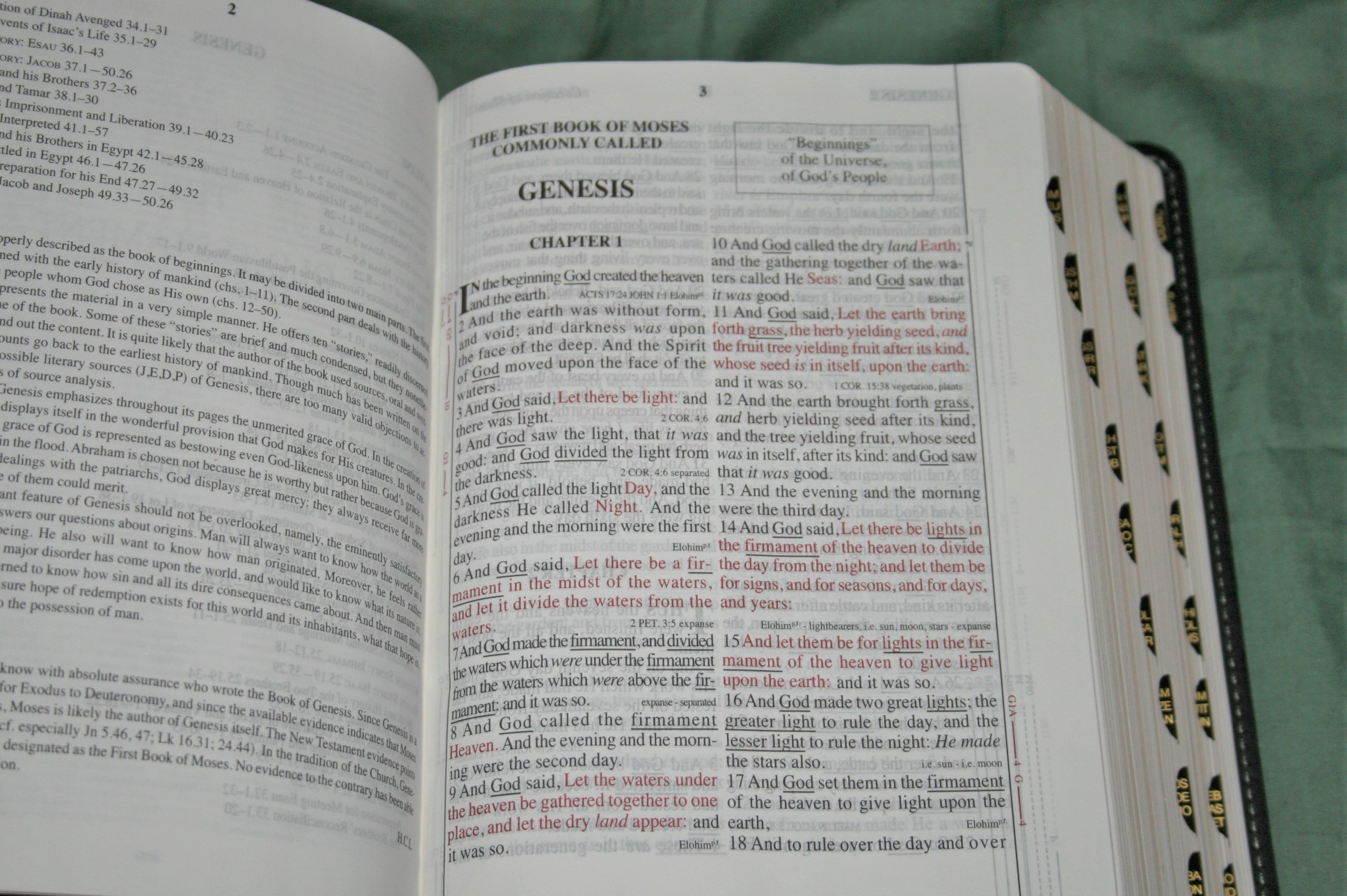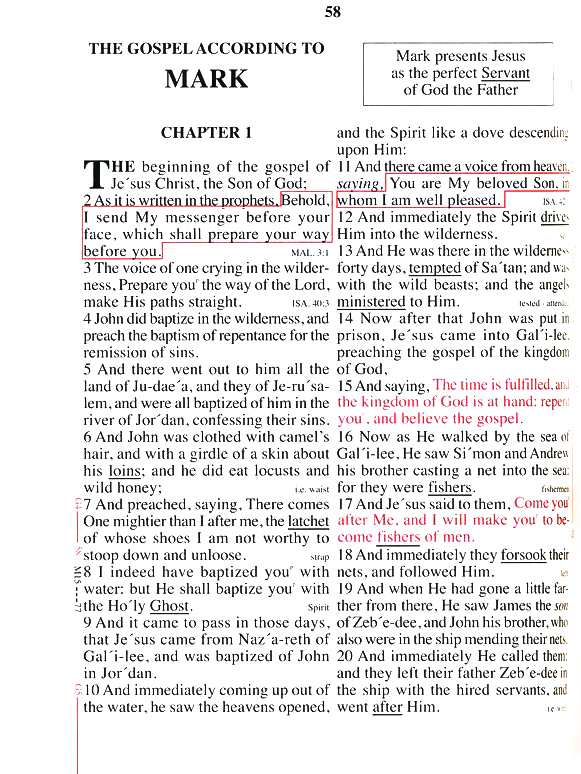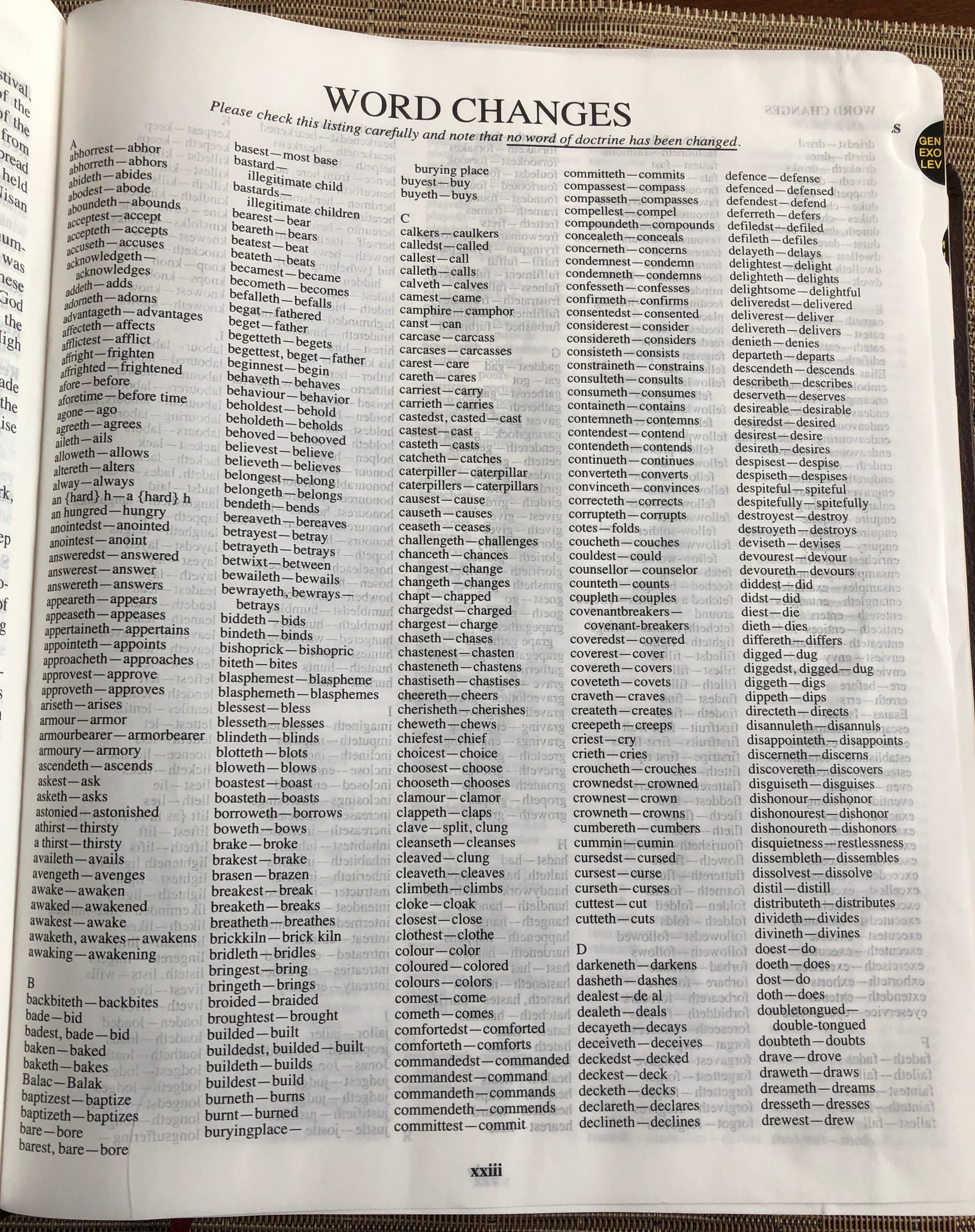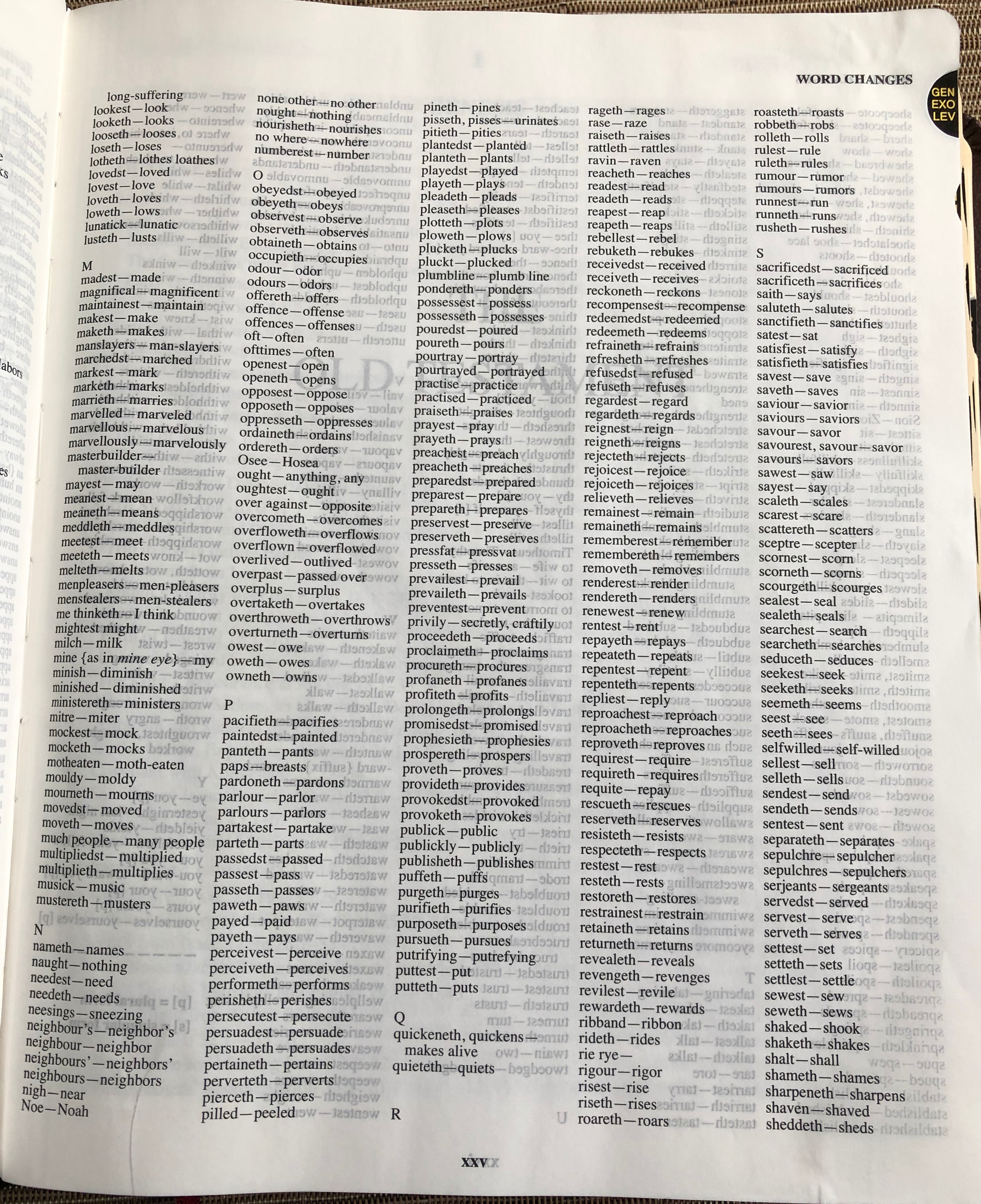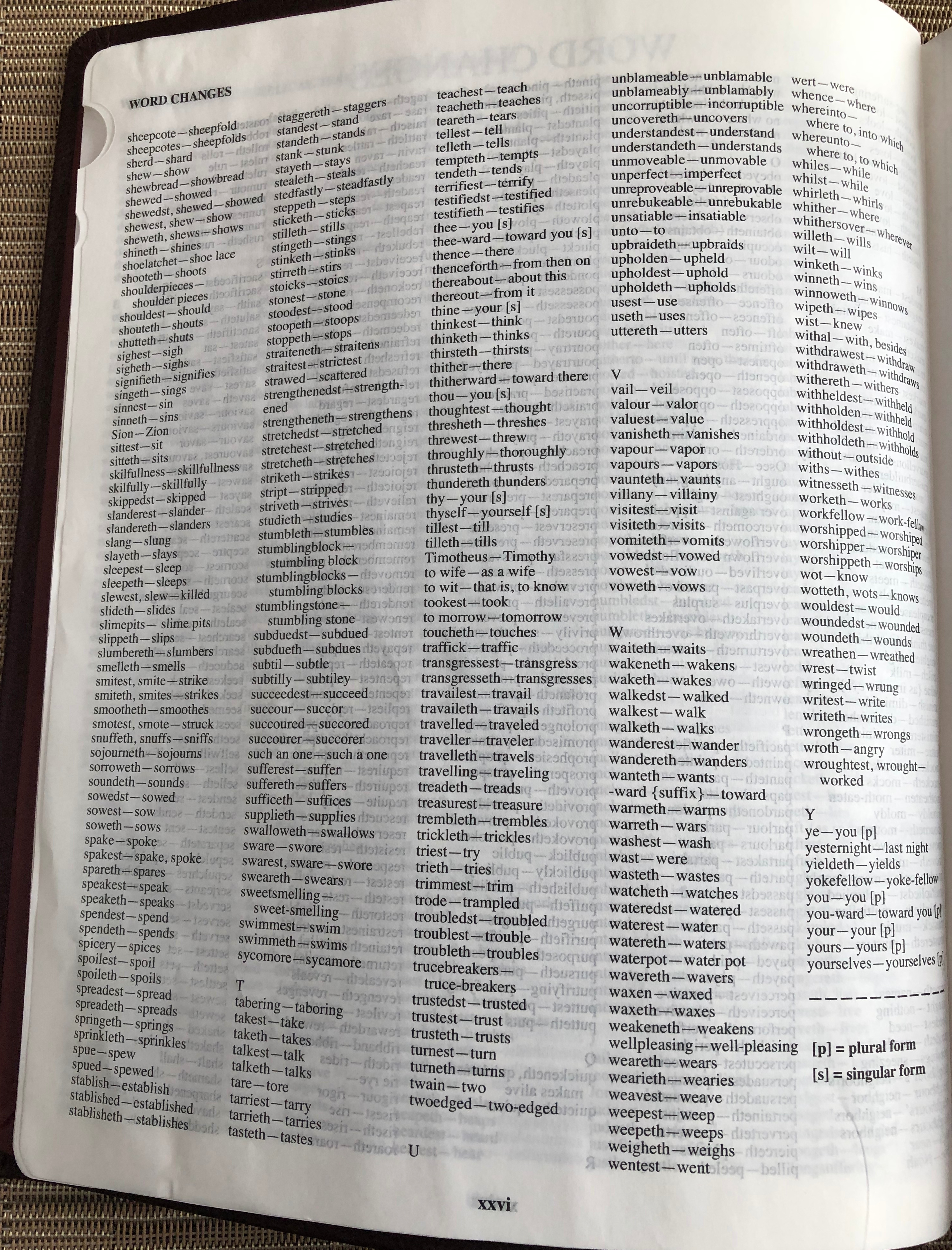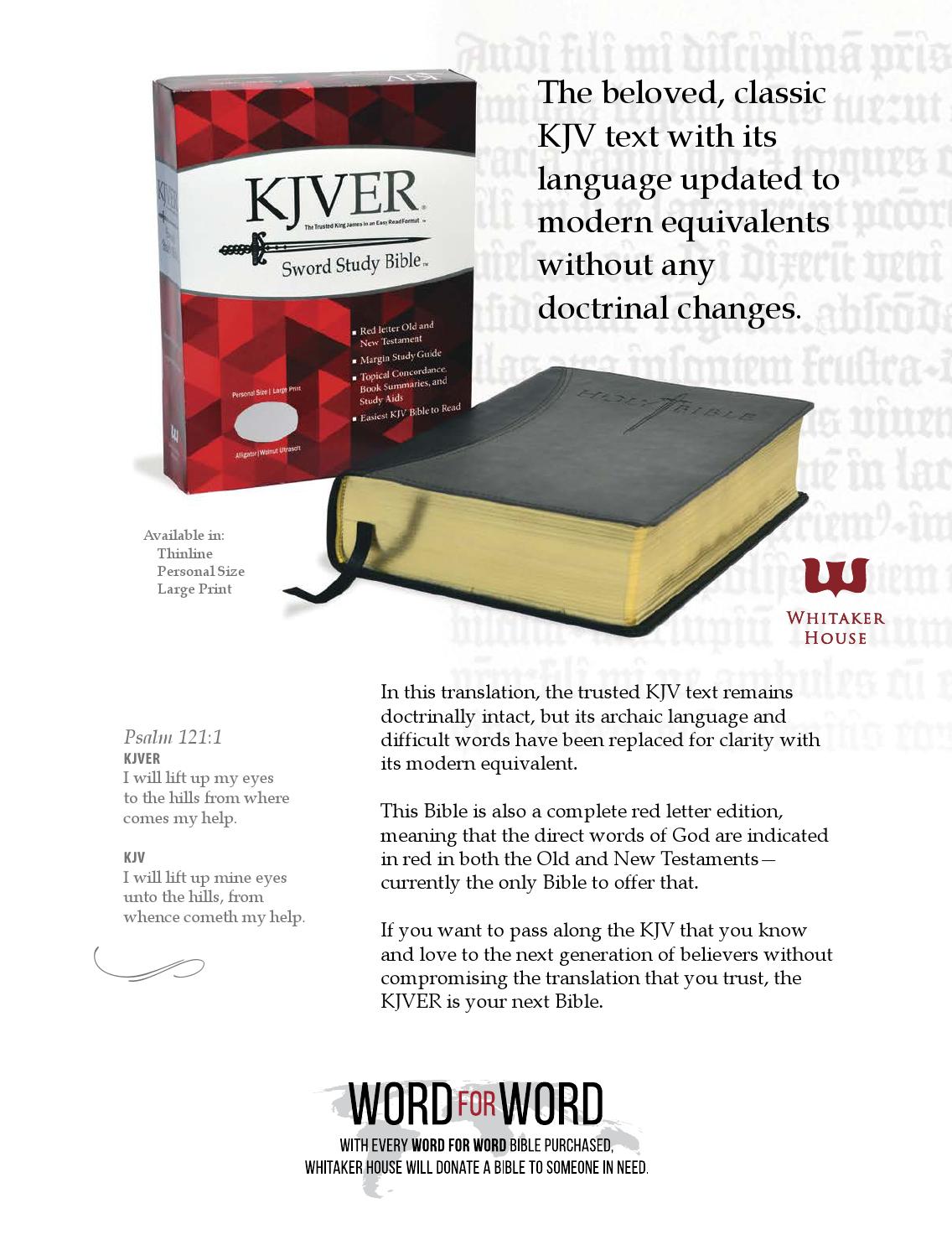- Jul 22, 2014
- 41,508
- 7,861
- Country
- United States
- Faith
- Non-Denom
- Marital Status
- Married
Comparison Between:
The KJV vs. the KJVER (The King James Version Easy Read):


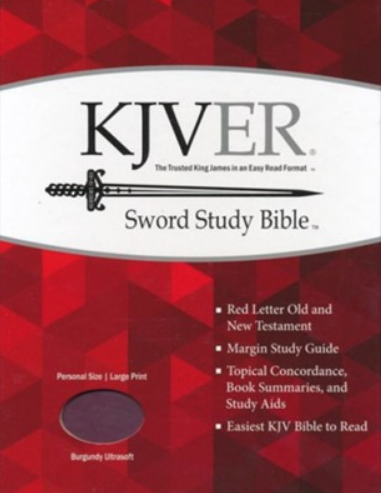
Overall Assessment:
Rating:
The score is a “B-” if you know the differences.
The score is an “F” if you don’t know the differences.
Score for aesthetics & quality of construction only (Not the translation):
The KJVER Sword Study in Brown Leather, Indexed, Giant Print Physical Quality: A+
If I was being picky, it would be an A- because the pages are thin, and can stick together in some places. If you don't want to damage the pages and get frustrated in opening them sometimes, just get a fingertip moisturizer like this one:
The Sort of Good and the Bad:
The sort of good?
I have the brown/red leather cover with gold lettering with a gold edge (You can check it out here). Very nice. I can say it is probably my favorite Bible in regards to presentation and the feel. In regards to the aesthetics alone and not the translation: It’s probably the best physical Bible I have ever owned. Granted, if you don’t like super thin pages, then this is not the Study Bible for you. But I love the leather, and how it holds in my hands. I also love the red ribbon bookmark, the indexes showing me the books in the Bible, and the giant print (Note: The giant print is good because the defined words are really small). If you are more of a die hard KJV only person, you can get the KJV Sword Study Bible, instead (Just be forewarned that it still may have a few of those pesky bad footnotes that push the Modern Translation agenda; But it does not change the text all too much though). Just do not get the black leather with the black lettering. I made this mistake and had to send it back. The black on black looks kind of ominous (or not so wholesome or heavenly looking).
The bad?
Actual Changes to the Text That Affect The Meaning:
Major Changes on Words That Alters Meaning:
This is problematic because an “idol shepherd” suggests that this shepherd is both worthless and idolatrous. An “idle shepherd” is just a worthless shepherd and not an idolatrous one.
Changes on Words That Should Have Been Left Alone, and Simply Defined:
The KJV says “bewrayeth” and the KJVER says “betrays” in Matthew 26:73. While this can be defined as such in the dictionary, it can also mean “to expose.” The word should have been simply updated slightly to “bewrays” and it should have simply been underlined and defined (as a footnote) in at least two ways. For it is an older word that can potentially have two different kinds of meanings in context here.
Major Changes on when to capitalize and when not to capitalize that alters Meaning:
It should be “spirit” not “Spirit” in 1 John 5:8. This should clearly not be capitalized. Only Jesus (the second person of the Godhead) is in agreement with the water and the blood, and not the Holy Spirit. The spirit agrees with the water and the blood.
Other changes on when to capitalize and when not to capitalize that alters meaning:
The KJV vs. the KJVER (The King James Version Easy Read):



Overall Assessment:
Kind of good, and yet also bad. Kind of good only if you know the differences and you have a hard time reading the “thee’s and “thou’s starting out in studying the Bible or if you want to switch on occasion to read the KJV in a more modern tongue. I have looked at different KJV versions (like the AKJV, NKJV, KJV2000). This one seems to be the best one so far in regards to not perverting the text beyond recognition (albeit still not perfect). Slight changes are a concern here, but they are not a major problem like other King James Bibles out there (like the New King James). But one has to realize that a reader of the KJVER is losing information here they are not aware of these changes. It passes in some cases, and fails at other times in the pure Cambridge Edition test given by Bible Protector (See here). It gets 9 out of 12 right; But there are other changes, as well (of which I mention below). Please take note that this is not an exhaustive examination. I would also like to encourage my fellow KJV advocates to look more into the KJVER Translation by comparing it with the traditional KJV for themselves, as well.
Rating:
The score is a “B-” if you know the differences.
The score is an “F” if you don’t know the differences.
Score for aesthetics & quality of construction only (Not the translation):
The KJVER Sword Study in Brown Leather, Indexed, Giant Print Physical Quality: A+
If I was being picky, it would be an A- because the pages are thin, and can stick together in some places. If you don't want to damage the pages and get frustrated in opening them sometimes, just get a fingertip moisturizer like this one:
The Sort of Good and the Bad:
The sort of good?
- Well, distinction in persons is made: The KJVER renders Jeremiah 34:16 correctly. It says “whom you[p]...” suggesting the same thing as “whom ye” in the Cambridge Edition.
- They do not add the defined words buried in the heart of the sentence itself, but simply put the defined words in a smaller font below the verse.
- Upon my initial investigation: It appears many verses are not mutilated beyond recognition like other KJV Bibles. But I am still examining this version to see the differences still. So the KJVER Translation is kind of decent so far, but it is still under an impending investigation.
- This translation is known for being available in the Sword Study Bible. If you get the KJVER Sword Study Bible, make sure it is:
(a) Indexed
(b) Leather
(c) Giant Print
(d) Not the black lettering on a black cover (unless you like ominous or morbid looking things).
I have the brown/red leather cover with gold lettering with a gold edge (You can check it out here). Very nice. I can say it is probably my favorite Bible in regards to presentation and the feel. In regards to the aesthetics alone and not the translation: It’s probably the best physical Bible I have ever owned. Granted, if you don’t like super thin pages, then this is not the Study Bible for you. But I love the leather, and how it holds in my hands. I also love the red ribbon bookmark, the indexes showing me the books in the Bible, and the giant print (Note: The giant print is good because the defined words are really small). If you are more of a die hard KJV only person, you can get the KJV Sword Study Bible, instead (Just be forewarned that it still may have a few of those pesky bad footnotes that push the Modern Translation agenda; But it does not change the text all too much though). Just do not get the black leather with the black lettering. I made this mistake and had to send it back. The black on black looks kind of ominous (or not so wholesome or heavenly looking).
The bad?
- Can subtly push you into the Modern Translation camp way of thinking if you believe some of their footnote definitions (See my points below).
- They do get a few words wrong.
- They list the changes of words, but I have found a few changes that do not appear in their listing.
- They say it lines up with the NKJV on the back of the box (that the Bible came in). This is not something to boast in. The NKJV is seriously altered in many verses and does not faithfully follow the Textus Receptus alone or the faithful KJV. From my assessment of the changes in the NKJV that is for the worse, it does not appear the KJVER is siding with the NKJV (Which is a good thing). Perhaps they were suggesting the KJVER lines up with the NKJV in regards to it removing the “eth” from words, and replacing the “thous” with “you” or something. In either case, they should not boast that this is like the NKJV (If they want to attract King James readers because most KJV advocates (like myself) consider the NKJV to be a bad translation).
Actual Changes to the Text That Affect The Meaning:
Major Changes on Words That Alters Meaning:
#1. Zech. 11:17 KJV "Woe to the idol shepherd that leaveth the flock!"
Zech. 11:17 KJVER “Woe to the idle shepherd that leaves the flock!” worthless
This is problematic because an “idol shepherd” suggests that this shepherd is both worthless and idolatrous. An “idle shepherd” is just a worthless shepherd and not an idolatrous one.
Changes on Words That Should Have Been Left Alone, and Simply Defined:
#1. Matt. 26:73 KJV, “for thy speech bewrayeth thee.”
Matt. 26:73 KJVER “for your speech betrays you.” ............................................................................................
The KJV says “bewrayeth” and the KJVER says “betrays” in Matthew 26:73. While this can be defined as such in the dictionary, it can also mean “to expose.” The word should have been simply updated slightly to “bewrays” and it should have simply been underlined and defined (as a footnote) in at least two ways. For it is an older word that can potentially have two different kinds of meanings in context here.
Major Changes on when to capitalize and when not to capitalize that alters Meaning:
#1. 1 Jhn. 5:8 KJV says, “And there are three that bear witness in earth, the spirit, and the water, and the blood: and these three agree in one.”
1 Jhn. 5:8 KJVER says, “And there are three that bear witness in the earth, the Spirit, and the water, and the blood: and these three agree in one.” .............................................................. .......... .........................................................................
It should be “spirit” not “Spirit” in 1 John 5:8. This should clearly not be capitalized. Only Jesus (the second person of the Godhead) is in agreement with the water and the blood, and not the Holy Spirit. The spirit agrees with the water and the blood.
Other changes on when to capitalize and when not to capitalize that alters meaning:
#1. Acts 11:28 KJV says, “and signified by the spirit that there should be great dearth throughout all the world:”
Acts 11:28 KJVER says, “and signified by the Spirit that there should be great dearth throughout all the world:” indicated - famine ........................................................................
It should be “spirit” not “Spirit” in Acts 11:28. This verse appears to be in dispute among believers. It can read both ways, but if one holds to a pure Word (like the Cambridge circa 1900) (like myself), they should favor the uncapitalized version of this verse.
Last edited:



